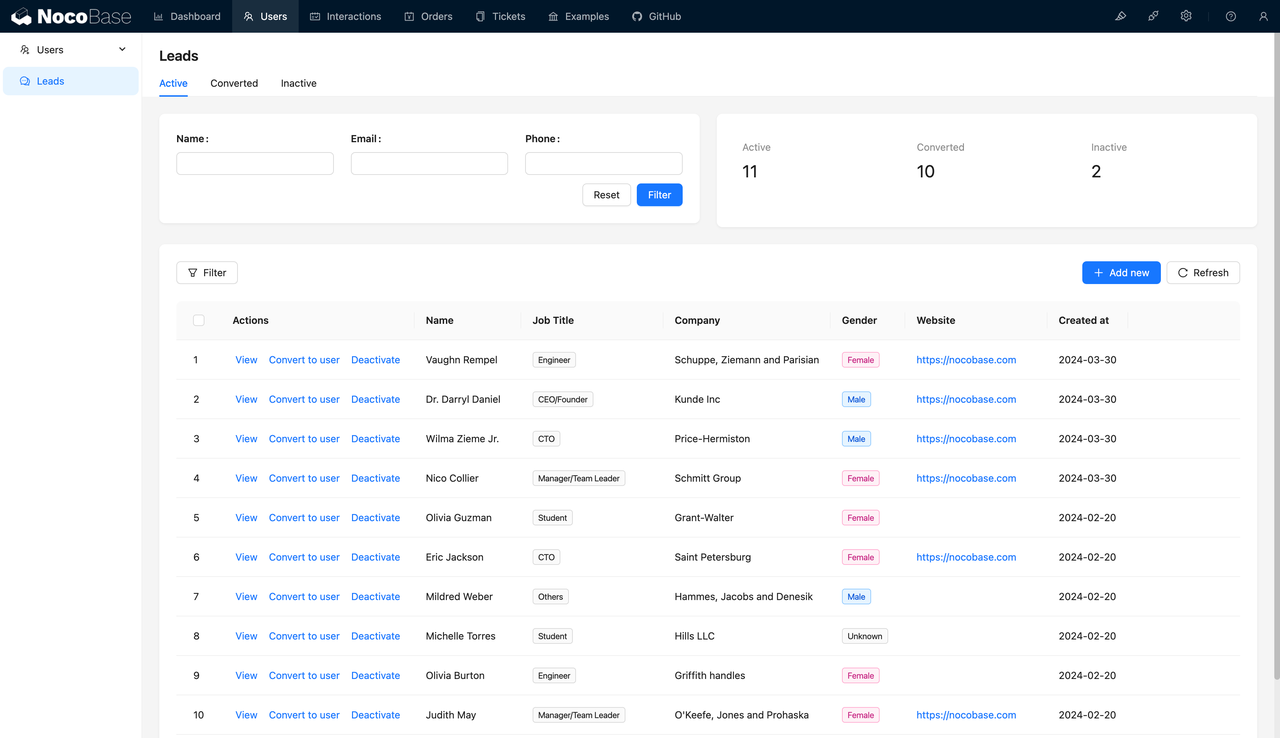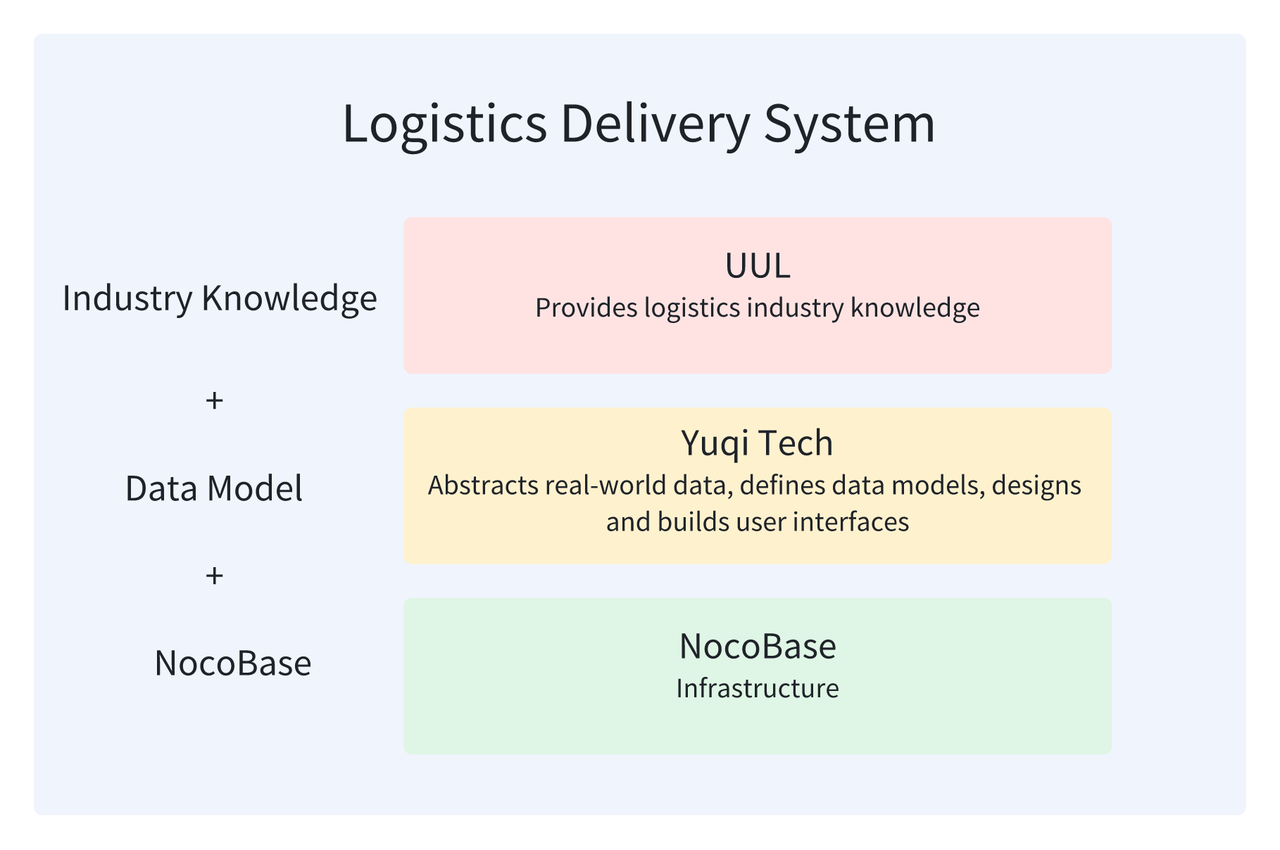In today’s rapidly evolving digital era, businesses face increasingly complex technological challenges and market competition. To remain competitive and accelerate business innovation, many companies are turning to low-code open-source platforms. However, selecting the right low-code platform and implementing it successfully remains a challenge.
This article explores five successful case studies that demonstrate how low-code open-source platforms have addressed real-world challenges in various sectors, including logistics, financial services, energy, and aerospace & defense. These case studies provide valuable insights and best practices.
Why Are Open-Source Low-Code Platforms So Important?
Low-code platforms enable businesses to build and deploy applications at a lower cost and faster pace. By reducing reliance on traditional programming, these platforms allow business users and developers to collaborate more effectively, quickly responding to market demands and technological changes.
Additionally, open-source platforms offer flexible customization and scalability, allowing businesses to tailor solutions to their unique needs.
Related Articles:Top 15 Open-Source Low-Code Projects with the Most GitHub Stars - NocoBase
Explore Top 5 Success Cases
1. The collaboration between NocoBase and UUL
How to solve the problem of insufficient data system processing capacity through a low-code platform and achieve a rapid upgrade of the logistics system?
NocoBase
NocoBase is an open-source, self-hosted no-code and low-code development platform. Its plugin-based architecture allows developers to easily add and customize features to meet a variety of complex business needs. With NocoBase, developers can combine data model-driven design with an intuitive WYSIWYG interface to achieve seamless data management and automated operations.
Features:
- Data model-driven: Unlike traditional form and table-driven methods, it adopts data model-driven development, providing unlimited development capabilities.
- Highly scalable: All features are provided through plugins, using a microkernel architecture, supporting private deployment.
- WYSIWYG interface: An intuitive operation interface that simplifies the development of complex systems.
- Open-source technology stack: Uses mainstream technology stacks such as Node.js and React to ensure transparency and control.
🙌 Have a try: NocoBase Tutorial – Task Management System
UUL
- Industry: Logistics
- Scale: Medium-sized enterprise
Challenges
UUL is facing a severe test of the data system’s processing capacity due to the diversity and complexity of business. Existing integration solutions are gradually revealing their drawbacks: software systems often lag behind business needs, and the cost of collaboration across departments and businesses is rising sharply. The best business practices are highly bound to individual employee experience, making it difficult to promote within the entire group, which greatly limits the scale development.
There is an urgent need for a comprehensive supply chain logistics delivery system, which not only includes OA, CRM, and FMS, but also needs to integrate multiple business operation modules such as WMS, TMS, CDS, OMS, and customer service support systems to meet the needs for efficient management and flexible response.
Solutions
The low-code platform provided by NocoBase enables UUL to quickly upgrade their logistics system. NocoBase enables flexible and intuitive interface design based on data models, allowing users to receive clear and immediate feedback when interacting with data.
In this collaborative project, UUL contributed expertise and knowledge in the logistics industry. Yuqi Tech was responsible for data modeling and user interface design, while NocoBase provided infrastructure support. This project structure facilitated the efficient and flexible development of the logistics delivery system.
Delivering digital management systems in this collaborative mode greatly improved delivery speed and significantly reduced costs to a lower magnitude.
It is attributed to the excellent system design logic of NocoBase:
- Model-driven Logic: Once the data model is defined at an early stage, building the page later becomes much more straightforward.
- Function as a Plugin: NocoBase’s architectural design allows developers to develop new plugins that adopt new requirements and can be reused.
System Architecture:
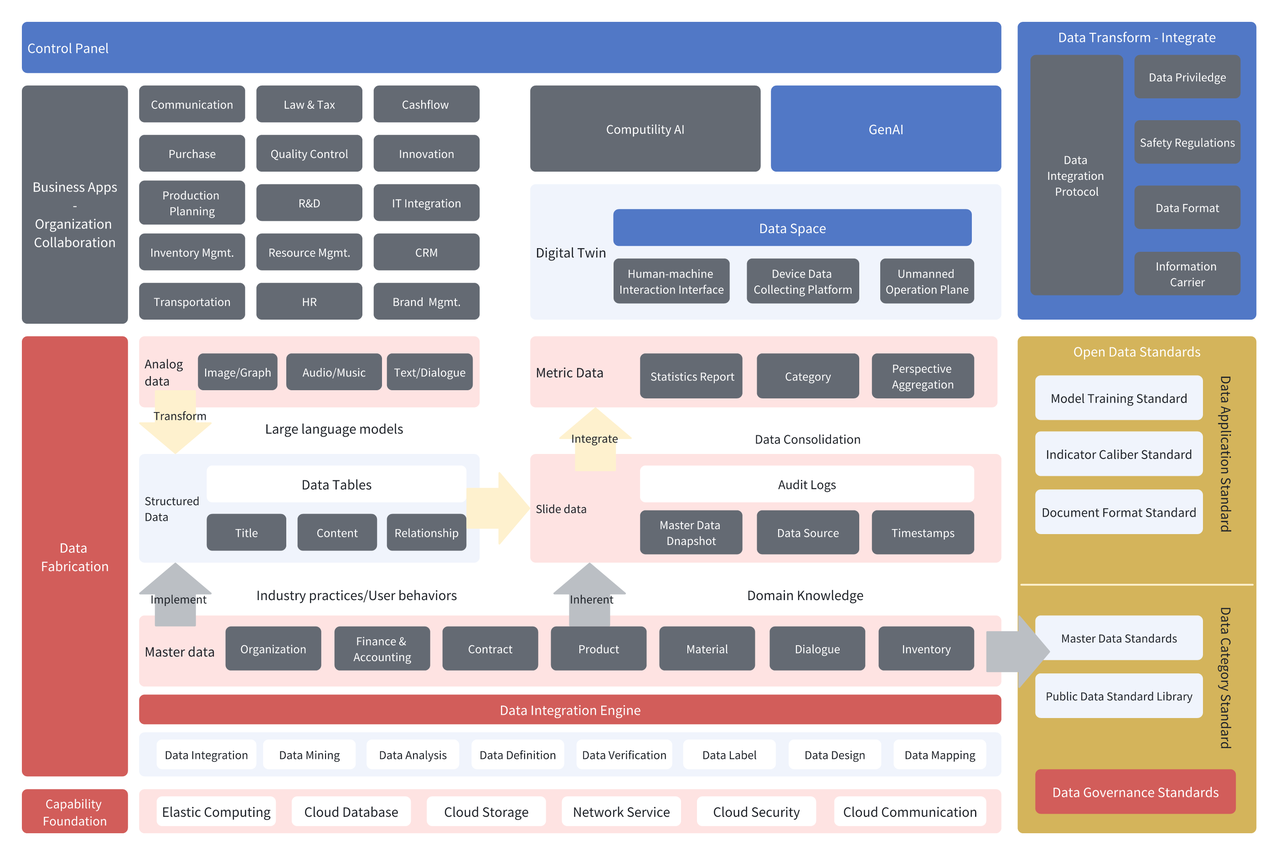
Customer Feedback
Zhang Zhuo shared:
“As an experienced NocoBase user, I can build a page in just 3 minutes. Once I establish the model based on data standards and configure the fields, I can set up the UI on the configuration page to develop the system. While going through business processes and integrating complex back-end functions may take longer, creating a functional page in NocoBase is generally quick. For example, our team can implement a small content management system or product center within a week. ”
Source:UUL Saves 70% on Logistics System Upgrade with NocoBase
2. Joget’s Transformation with SSI Securities
In the financial services sector, how to optimize customer relationship management and improve the efficiency of information search using a low-code platform?
Joget
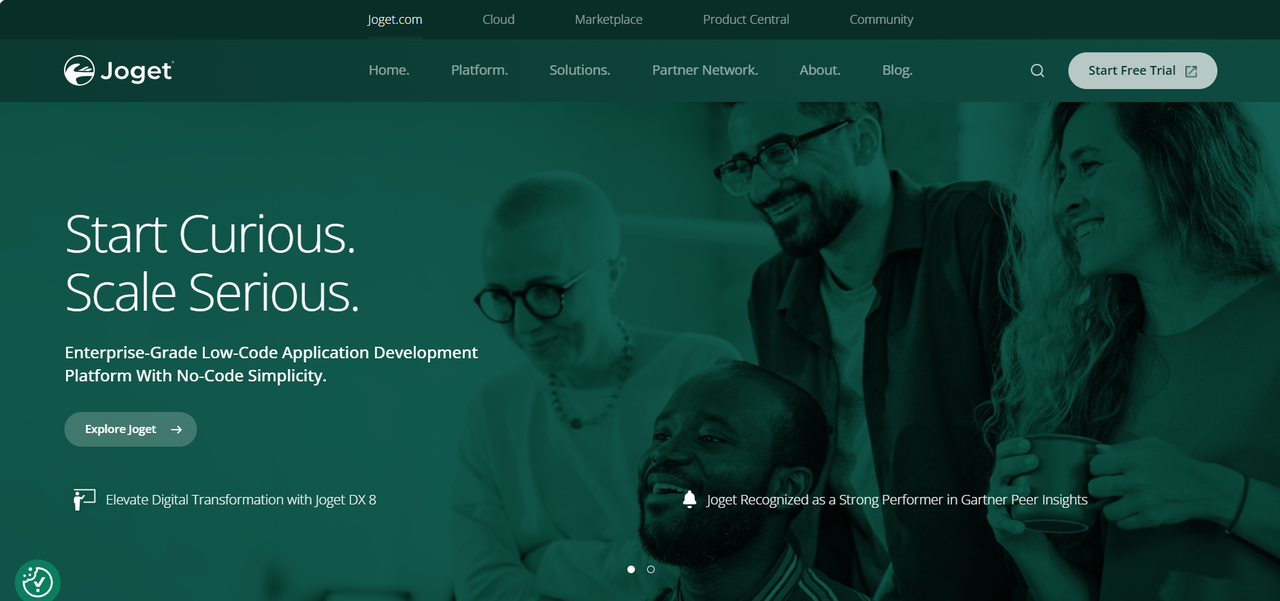
Joget is a comprehensive open-source low-code platform that combines business process management (BPM) and workflow automation capabilities. It supports the rapid construction and deployment of applications, with an intuitive drag-and-drop interface that is easy to integrate with various third-party systems.
💡 Read More: Best Open-Source Tools for BPM
Features:
- Intuitive user interface: The graphical user interface makes the design and development of applications simple and intuitive.
- Powerful workflow engine: The built-in workflow engine of the platform supports the automation of business processes.
- Flexible integration capabilities: Supports integration with various third-party systems and services.
- Scalability and customization: Allows users to extend the platform’s functionality through plugins and custom code.
SSI Securities

- Industry: Financial Services
- Scale: Large Enterprise
Challenges
In an era marked by digital advancements, SSI recognized the need to refine its customer relationship management practices. This journey led to a partnership with International Distribution Corporation (IDB), a pioneer in developing and operating VoIP Systems for a diverse range of industries. Together, they embarked on a strategic initiative to consolidate SSI’s fragmented customer service framework using the Joget open-source enterprise no-code/low-code platform.
The path to digital transformation is often fraught with challenges, and for SSI, the journey was no different. The company’s legacy systems, restricted to computer use, were not only slow but also posed risks to customer information security and were cumbersome when adapting to new procedures or creating varied customer request forms. This fragmentation led to delayed responses to customer inquiries, inconsistent resolution of customer tickets, and significant difficulties in managing and securing customer data.
Furthermore, the scattered support and resolution forms across multiple applications made it challenging for users to track their requests, resulting in fragmented data and inefficiencies in customer request management.
Solutions
Recognizing the need for change, SSI, in collaboration with IDB, embarked on a transformative project to develop a CRM support system using the Joget platform. This innovative solution was designed to address the pressing challenges head-on, enabling seamless customer onboarding and communication across phone, email, and chat channels.
Implemented within a mere two months, the system redefined how SSI managed customer relationships by providing a unified platform for interaction, engagement, and data management.
💡 Read More: The Ultimate Guide to Data Transformation Tools
The implementation of the Joget-based CRM solution marked a new era for SSI and its clients. The system introduced permission control, ensuring data security and access were meticulously managed. By integrating data from multiple sources into a centralized system, SSI achieved an 80% reduction in time spent searching for information, along with a significant decrease in the need to toggle between applications.
Key Results
- Improved information search efficiency: The CRM solution based on Joget greatly improved the efficiency of information search, reducing search time by 80%.
- Simplified onboarding process: By integrating Progressive Web Application (PWA) capabilities, the system can now manage the onboarding process seamlessly through mobile devices. PWA provides a hybrid web and native app experience, including offline support, background push notifications, and the ability to install applications on devices. This improvement not only enhances the user experience but also simplifies the process of discovering and installing applications.
- Fully compatible user experience: PWA supports multiple platforms, including Chrome OS, Linux, Mac, and Windows, ensuring a consistent full-screen application experience on all devices.
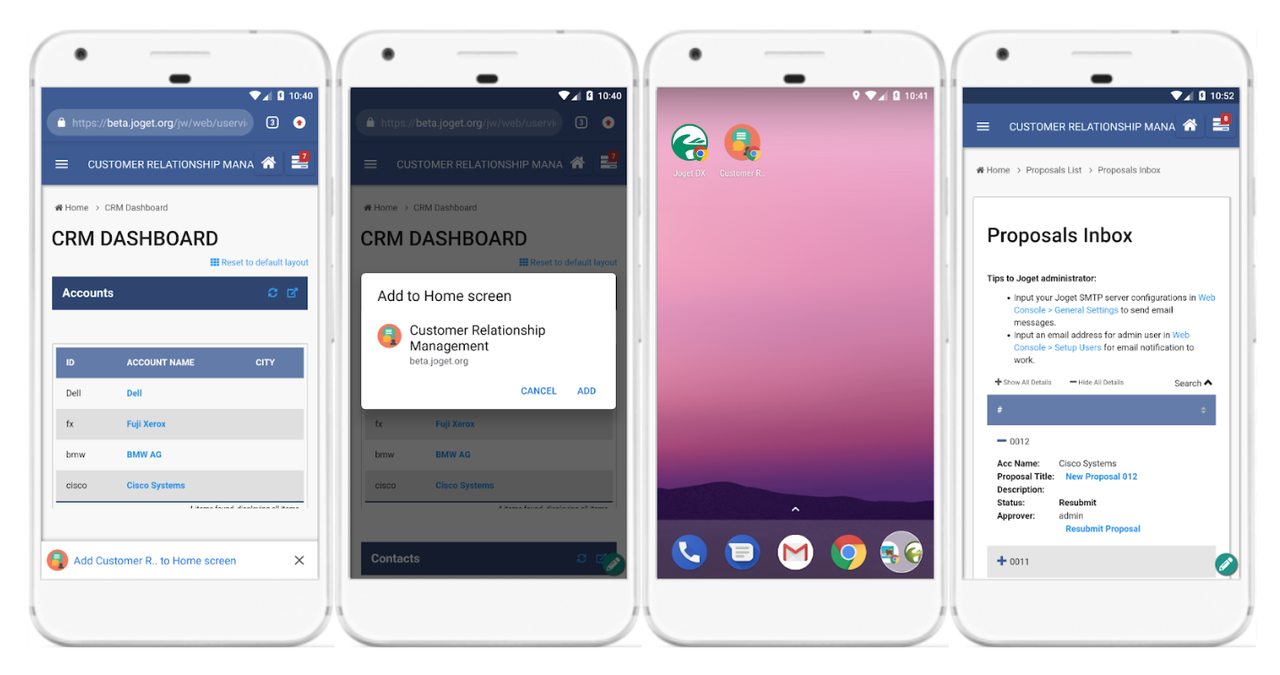
Source:Streamlining Customer Relationship Management with SSI Securities - Joget
3. Appsmith’s Success Story with Schmalz Schön
In the logistics industry, how to improve data visibility and operational efficiency through customized applications?
Appsmith
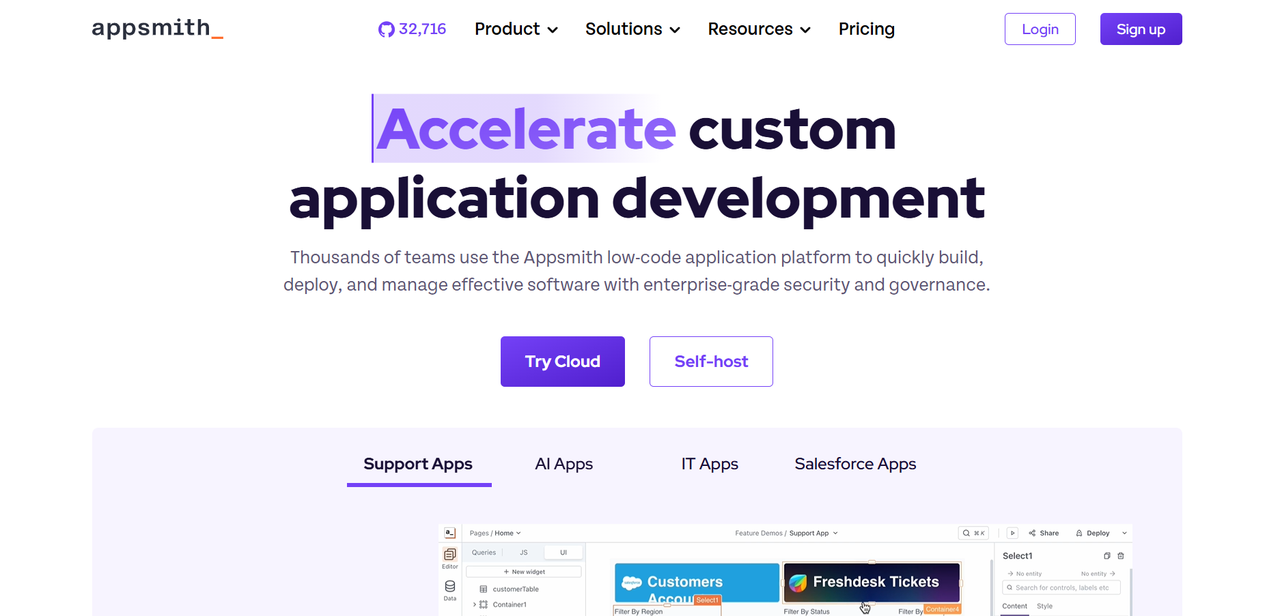
Appsmith is an open-source low-code platform designed to help developers and business personnel quickly build customized applications. It offers a wealth of integration capabilities and visual development tools, supporting the construction of complex business applications.
💡 Read More: Top 5 Open-source App Builder Tools with the Most GitHub Stars
Features:
- Responsive design: Provides responsive design tools that automatically adapt the user interface for both desktop and mobile devices.
- Comprehensive documentation support: The platform offers rich documentation and tutorials covering everything from basic operations to advanced features.
- Custom code capability: Users can embed custom code in applications to meet specific business logic needs.
- Agile development: The platform supports rapid prototyping and iterative development, allowing users to build and adjust applications in a short time.
Schmalz Schön

- Industry: Logistics
- Scale: Medium-sized enterprise
Challenges
Before collaborating with SCHMALZ+SCHÖN, PINELTA faced several serious challenges that affected the efficiency and accuracy of its logistics operations.
- Insufficient data visibility: There was a lack of overall data visibility, and departments had inconsistent answers to basic operational issues (such as the size of the existing fleet), leading to inaccurate and difficult-to-integrate information. This data dispersion made it difficult to obtain accurate and unified information.
- Tedious manual processes: The company heavily relied on manual operations and paper workflows. Common tasks such as printing, scanning, and rescanning documents consumed a lot of time and resources while increasing errors and inaccuracies in data management.
- Data accuracy issues: There were data accuracy issues in managing supplier addresses and processing transportation orders. Inconsistent spelling of customer names and addresses affected the consistency of reports and made it difficult to obtain effective insights from the data to support decision-making.
💡 Read More: 5 Best Tools for Building Workflow Automation
Solutions
To address the business challenges faced by SCHMALZ+SCHÖN in different departments, PINELTA sought a low-code platform that could drive digital transformation. After evaluating various options, PINELTA chose Appsmith as the solution.
Appsmith’s intuitive responsive interface, comprehensive documentation support, and flexibility of custom code made it an ideal choice. The features and capabilities of Appsmith made PINELTA see its great potential in transforming the development process and improving customer results.
- Building customized applications: Appsmith enabled PINELTA to develop a series of customized applications for SCHMALZ+SCHÖN. These applications include data visualization and tracking tools, HR management systems, and project management applications. Through these applications, users can access and integrate data sets from different databases on a centralized platform, achieving centralized management of information.
- Efficient and flexible platform: The low-code environment provided by Appsmith makes it easy for people within the organization to create and modify applications during the digital transformation process. The platform supports visual and analytical data according to specific needs, and this flexibility significantly improves efficiency compared to traditional development methods, making the development process more flexible.
- Agile development and rapid iteration: Using Appsmith, PINELTA was able to quickly build user interface prototypes and make real-time adjustments during the design process, eliminating the time-consuming steps of wireframing or modeling in traditional development. Appsmith’s agile development approach allows for rapid iteration and application customization, better meeting the specific needs of SCHMALZ+SCHÖN, thereby significantly improving development efficiency and accelerating the overall process.
Customer Feedback
By collaborating with Appsmith, PINELTA was able to deliver these applications 70% faster than developing them from scratch. Appsmith played a key role in automating previously tedious and time-consuming processes, enabling them to visualize data, simplify workflows, and gain operational insights. These applications, along with other applications developed by PINELTA, are part of SCHMALZ+SCHÖN’s broader digital transformation plan aimed at optimizing processes and improving data visibility.
Source:SCHMALZ+SCHÖN Reduced Custom App Development Time by 70%
4.Budibase’s Digital Breakthrough with Covanta
How can the energy industry reduce redundant data entry and improve data quality through a low-code platform?
Budibase
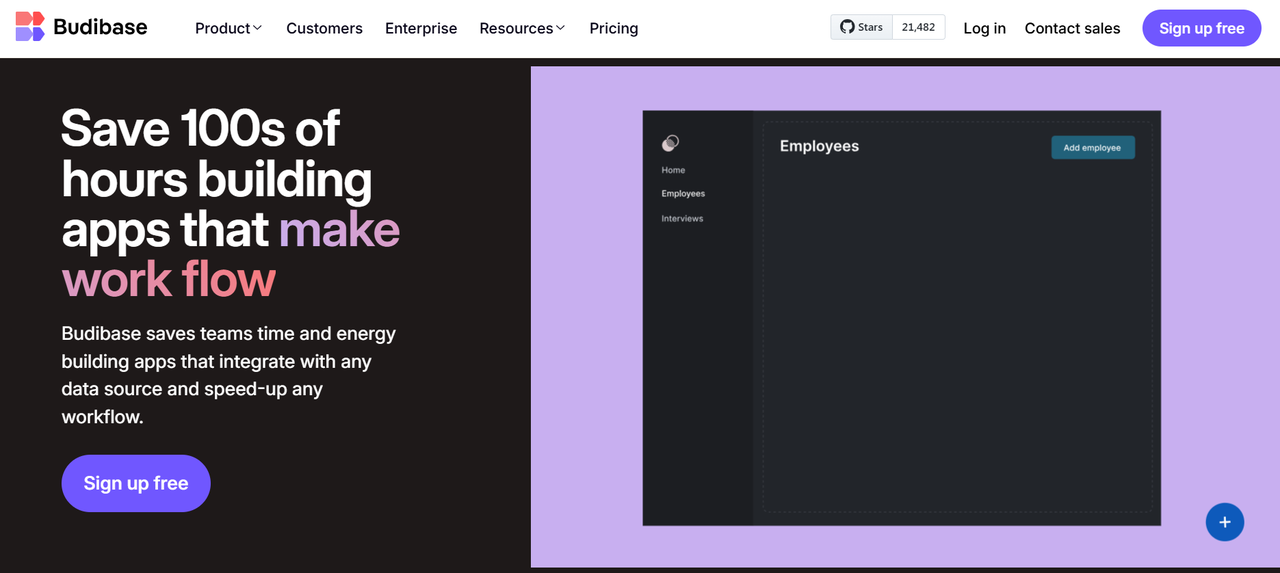
Budibase is an open-source low-code platform focused on building and managing business applications. It provides a simple user interface for quickly creating database-driven applications and supports a wealth of customization features.
💡 Read More: Complete Guide to Efficient Business Application Development
Features:
- Easy to modify and expand: The platform’s modular design allows users to easily modify existing features or add new ones.
- Supports cloud-native and cloud-neutral: Supports running in various cloud environments, including public, private, and on-premises deployments.
- Powerful data integration: Budibase allows integration with multiple data sources, including databases, APIs, and external services, enabling centralized management and real-time updates of data.
Covanta

- Industry: Energy
- Scale: 4,000 employees
Challenges
At Covanta, we are focused on supporting a circular economy. Like many companies, too many of our workers are saddled with redundant data entry to provide the insights needed to run our business well. We were drowning in spreadsheets and Covanta was seeking a sustainable way to effectively streamline all of our data entry and allow it to coexist with other data sources. We searched high and low for something providing:
- Low total cost of ownership
- Easy to modify and extensible
- Cloud native
- Cloud Agnostic
Customer Feedback
Budibase was the only solution that checked all the boxes for Covanta. Covanta expects to realize $3.2MM in savings due to the elimination of redundant data entry. This is critical in times like these when there are more jobs than people. We simply must reduce the amount of redundant low value activities burdening our workforce. On top of that we expect our data quality to improve significantly and bring more credibility to the metrics and KPI’s we use to manage our business.
Charles Link, Senior Director, Data and Analytics
Source:Why Covanta uses Budibase
5. Mendix’s Application in Aerospace and Defense
How to cope with industry competitive pressure and enhance innovation capabilities through a low-code platform?
Mendix
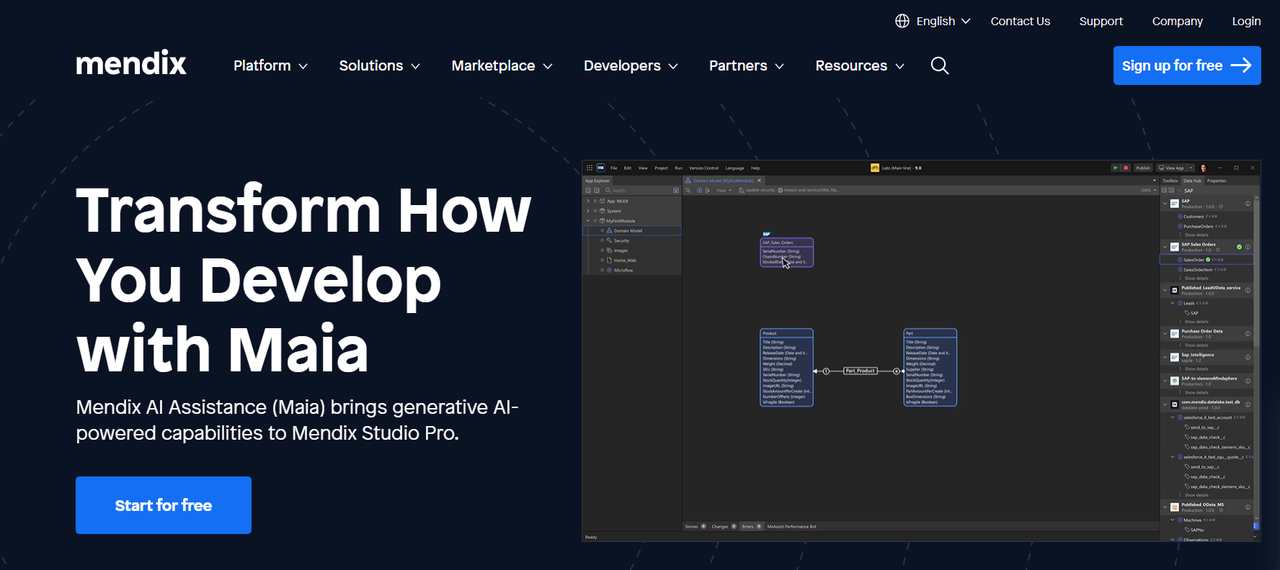
Mendix is a low-code development platform designed to accelerate the development and deployment of applications. It provides an integrated environment that allows users to build and manage applications through a visual interface rather than traditional programming.
Features:
- Visual development environment: Provides an intuitive drag-and-drop interface and graphical development tools, allowing users to design applications visually without writing a lot of code.
- Full-stack support: Supports full-stack development from front-end to back-end, allowing users to design, develop, and manage applications on the same platform.
- Powerful integration capabilities: Supports seamless integration with various third-party systems and services, including ERP, CRM, and APIs.
- Cross-platform compatibility and flexible deployment: Supports the creation of cross-platform applications, including web and mobile applications, while offering cloud-native and on-premises deployment options.
💡 Read More: Build CRM in Hours: Top No-Code/Low-Code Tools You Need to Know
Aerospace and Defense Industry

- Industry: Aerospace and Defense
- Scale: Large Enterprise
Challenges
- New market players need to differentiate: Technology is making the industry accessible to new players, placing increased pressure on incumbents to revolutionize their R&D practices. Established providers need to invest in order to differentiate themselves.
- Demand exceeds rate of supply: Additive manufacturing is increasingly becoming a valued part of the production process as its reliability improves. Giving OEMs the freedom to produce parts on demand.
- Aging workforce stalls innovation: There is a growing skills gap to manage legacy systems in languages that are no longer used as the experts near the end of the careers. Skills shortages, a lack of new talent, and rising training costs i are stifling innovation and growth.
- Growing data siloes fuels data chaos: Siloed data creates a problem on two fronts. Data saved in multiple locations is difficult to govern and locate, which increases inefficiency and risk. If your data is organized and easily accessible it makes it more difficult to analyze effectively, leaving you at a disadvantage when it comes to making data-driven decisions.
💡 Read More: Top 6 Core App Dashboard Building Tools
Solutions
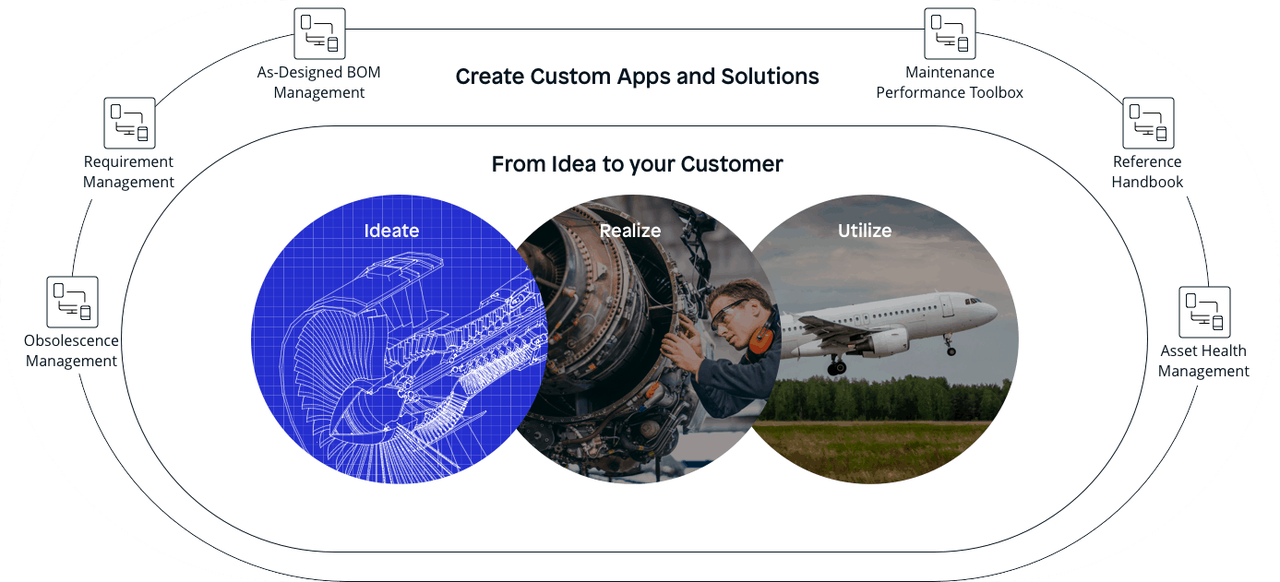
- Low-code platform improves flexibility: Aerospace and defense companies can use low-code platforms such as Mendix to reduce costs and shorten time to market in innovative ways while optimizing product performance.
- Digital twin technology: A digital twin is an exact virtual model of a product or production facility, showing the development process throughout its entire lifecycle. It can predict behavior, optimize performance, and use insights from previous design and production experiences. By exploring “what-if” scenarios and predicting future performance, digital twins can achieve a closed-loop connection between virtual product development and actual production systems, providing actionable insights for the entire lifecycle of products and production operations, supporting informed decision-making.
Source:Aerospace and Defense
Conclusion
In today’s rapidly changing digital era, low-code platforms are becoming key tools for enterprises to achieve agile development and rapid innovation.
This article has shown through five specific cases how to use low-code open-source platforms to solve real business challenges, achieving significant efficiency improvements and cost savings.
When evaluating and selecting a low-code platform, understanding its core functions and successful application cases is crucial. It is hoped that the insights and cases provided in this article can provide valuable references for your decision-making.
Related reading:
- 5 Challenges of Developing with a No-Code Platform
- The Top 12 Open-Source No-Code Tools with the Most GitHub Stars
- Top 8 Open-Source CRUD Projects with the Most GitHub Stars
- Top 11 Open Source Internal Tools with the Most GitHub Stars
- Top 15 Open-Source Low-Code Projects with the Most GitHub Stars
- Exploring RAD: 5 Best Application Cases
